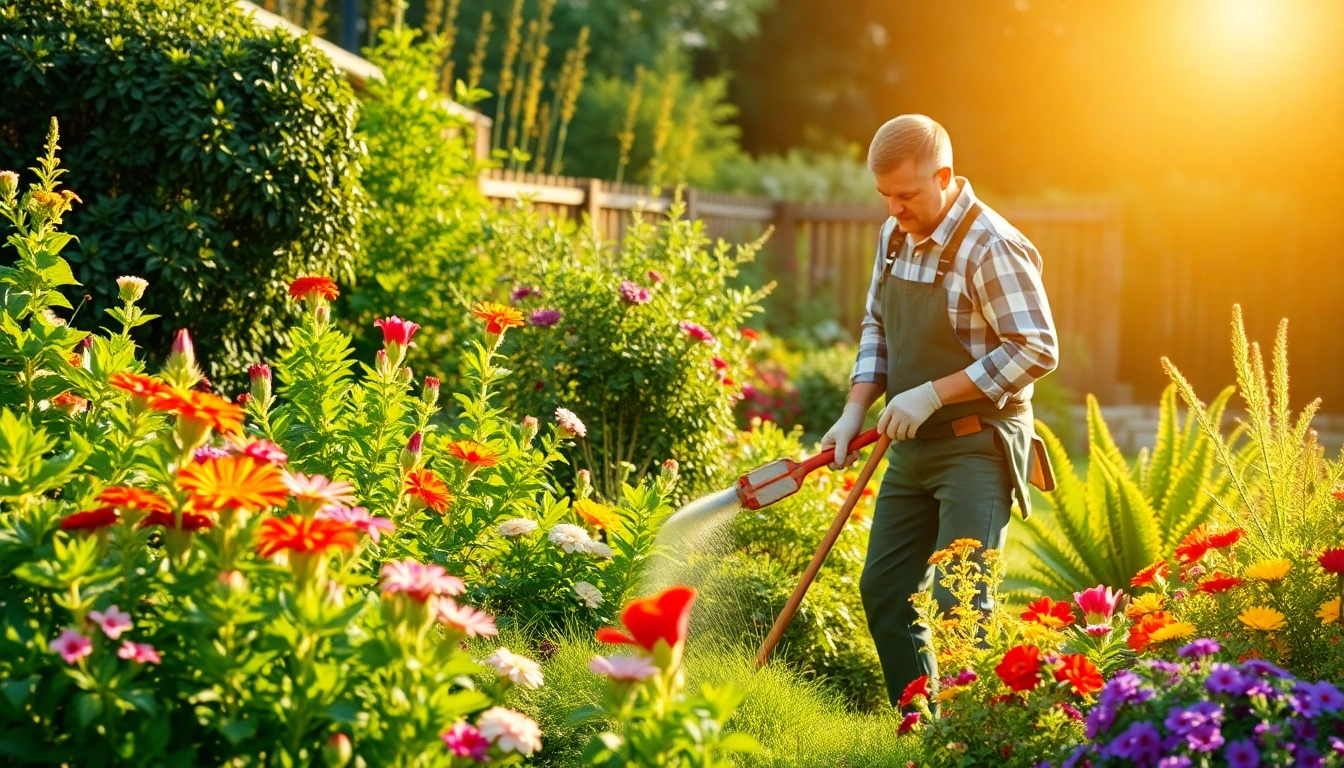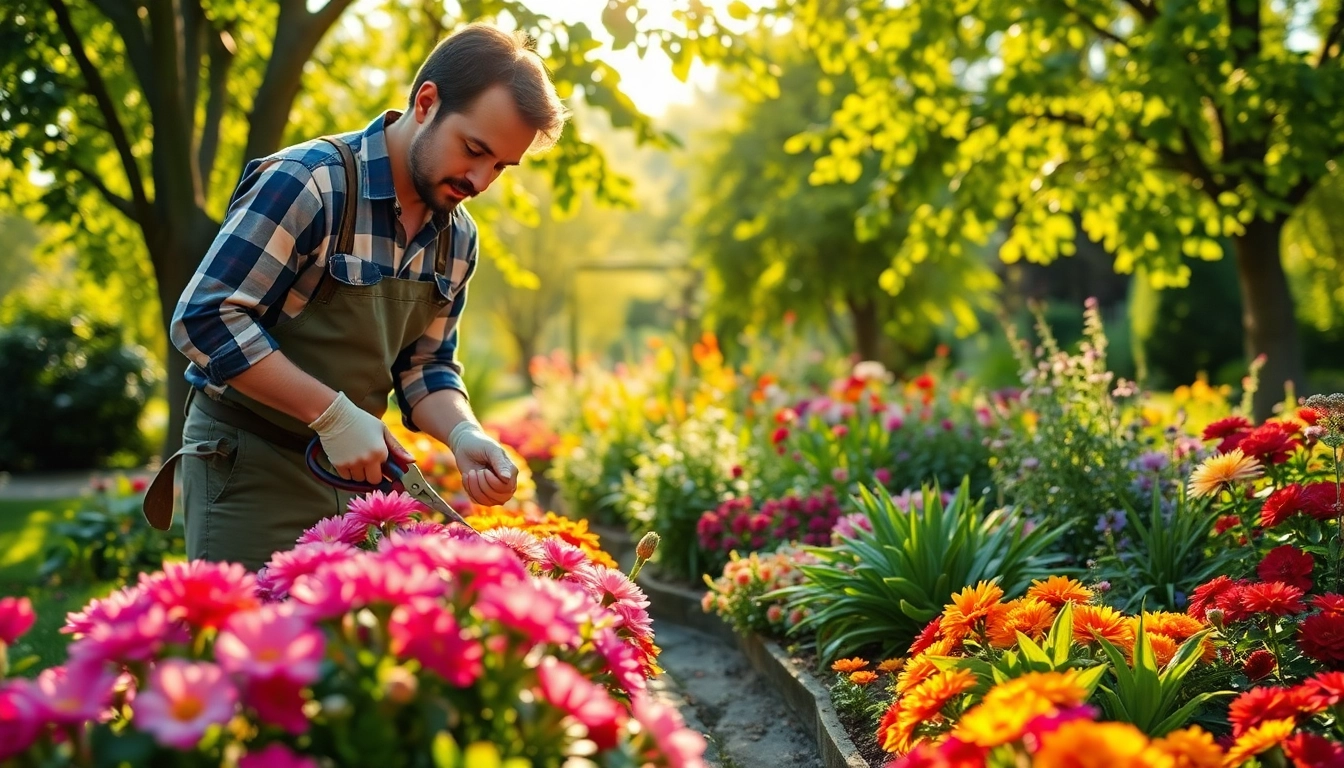Understanding Garden Maintenance Services
What is a Garden Maintenance Service?
A garden maintenance service is a professional offering focused on the upkeep and enhancement of outdoor green spaces, providing homeowners and property managers with expert assistance in maintaining aesthetic and functional garden elements. This service can range from simple lawn care to comprehensive landscape management, tailored to meet the unique needs of each client. By engaging a garden maintenance service, homeowners can ensure their gardens remain beautiful and healthy throughout various seasons.
Benefits of Regular Garden Care
Regular garden care provides a multitude of benefits, both aesthetic and environmental. Firstly, a well-maintained garden enhances the visual appeal of a home, potentially increasing its market value. An aesthetically pleasing outdoor space can also promote relaxation and mental well-being. Beyond visual benefits, regular garden maintenance plays a crucial role in plant health. Consistent care helps prevent pest infestations, diseases, and the proliferation of invasive plants that can harm native species.
Moreover, routine maintenance can lead to a more sustainable garden. Healthy plants, pruned correctly, can contribute to biodiversity. Regular maintenance practices, such as mulching and proper watering, can help conserve water and reduce the need for chemical fertilizers, fostering a more eco-friendly environment.
Services Typically Offered
Garden maintenance services typically encompass a range of offerings designed to address the diverse needs of gardens. Common services include:
- Lawn care: Mowing, aerating, fertilizing, and overseeding to promote healthy grass growth.
- Plant care: Deadheading, pruning, and fertilizing plants and shrubs to support growth and flowering.
- Weeding: Regularly removing weeds to prevent competition for nutrients and water.
- Pest control: Implementing integrated pest management strategies to minimize pest-related damage.
- Seasonal clean-ups: Removing debris and preparing gardens for changing seasons.
How to Select the Best Garden Maintenance Service
Assessing Your Garden’s Needs
The first step in choosing a garden maintenance service is to assess the specific needs of your garden. Understanding what your garden requires can help you communicate effectively with potential service providers. Consider factors like the size of your garden, the types of plants you have, and any specific issues you’ve encountered, such as pest problems or drained soil. Additionally, reflect on any aesthetic goals you may have—such as creating a unique garden design or enhancing flower beds and decorative features.
Evaluating Service Providers
Once you understand your garden’s needs, it’s essential to evaluate potential service providers. Start by researching local companies, checking their websites, reading reviews, and examining their portfolios of previous work. Look for providers with certifications or memberships in professional organizations, which often indicate a commitment to high standards. It’s also beneficial to seek recommendations from neighbors or friends who have had positive experiences with garden maintenance services.
Questions to Ask Potential Services
To further narrow down your options, prepare a list of questions to ask potential garden maintenance service providers. Important inquiries might include:
- What services do you offer and which are included in your base fee?
- Can you provide references or testimonials from past clients?
- How do you handle pest control and what methods do you use?
- Are you insured and licensed?
- What is your cancellation policy and how do you accommodate changes in service frequency or requirements?
Asking these questions can provide valuable insights into their work ethic, expertise, and customer service approach.
Common Challenges with Garden Maintenance
Pest Control and Prevention
Pest control is a primary challenge in garden maintenance. Many pests can quickly overwhelm a garden, leading to significant damage before they become noticeable. Effective pest control starts with prevention, which includes healthy soil practices and choosing pest-resistant plant varieties. Integrating natural pest control methods, such as beneficial insects and organic treatments, can make a positive impact.
Seasonal Plant Care Strategies
Different seasons bring unique challenges for garden maintenance. In the spring, garden services may focus on planting, fertilizing, and preparing for bloom time, while summer requires consistent watering and pruning. Autumn is the time for clean-up and preparation for winter weather. Each season requires tailored strategies to ensure plants thrive and gardens remain vibrant. Understanding these seasonal requirements can enhance your garden care plan.
Managing Water Usage Effectively
Water management is an essential aspect of garden maintenance, particularly in regions prone to drought or water restrictions. Implementing effective irrigation systems, such as drip irrigation or rainwater harvesting, can conserve water while keeping plants healthy. Additionally, using mulch can help retain soil moisture and reduce the need for frequent watering. Awareness of plant types and their water needs contributes to an efficient watering schedule.
Best Practices for Efficient Garden Maintenance
Creating a Maintenance Schedule
A garden maintenance schedule is essential for organizing and prioritizing tasks. A well-planned schedule lays out when to plant, fertilize, weed, and prune, helping you remain consistent with garden care. Many garden maintenance services offer seasonal plans that take into account climate and plant needs. Utilize these plans to guide your schedule, tailor it to your specific garden’s requirements, and ensure critical tasks are not overlooked.
Essential Tools and Equipment
Having the right tools is crucial for efficient garden maintenance. Some essential equipment includes a high-quality lawnmower, pruners, trowels, hoes, and watering tools. Investing in ergonomic tools can make gardening more enjoyable and less physically taxing. Regularly maintaining these tools, whether through cleaning or proper storage, can extend their lifespan and effectiveness.
Using Organic Methods for a Healthier Garden
Utilizing organic methods in garden maintenance can lead to healthier plants and a more sustainable ecosystem. This includes organic fertilizers, composting, and natural pest deterrents like neem oil or insecticidal soap. By focusing on building soil health and promoting biodiversity, you can create a thriving garden that’s resistant to diseases and pests without harmful chemicals.
Measuring the Success of Your Garden Maintenance Service
Key Metrics to Track
To ensure that your garden maintenance service is effective, it’s important to track certain metrics. Consider evaluating plant health, which can include growth rate, robust flowers or foliage, and overall appearance. Another key metric is pest prevalence; noticing a decrease indicates better pest control strategies. Additionally, tracking water usage and overall costs associated with maintenance can provide insights into the long-term financial sustainability of the service.
Gathering Feedback and Making Adjustments
Feedback is crucial for assessing the performance of your garden maintenance service. Regularly communicate with your service provider about your observations and any concerns. If certain plants are not thriving or if you notice recurring pest issues, addressing these concerns promptly fosters a collaborative approach to remedy them. Adjusting the care plan based on feedback ensures your garden continues to flourish.
Long-Term Care and Sustainability Goals
Long-term success in garden maintenance depends on setting sustainability goals. This may involve planting native species that require less water and support local wildlife or transitioning to organic gardening practices fully. Establish a clear vision that aligns with your values and the ecological health of your garden, and work with service providers committed to sustainable practices.



